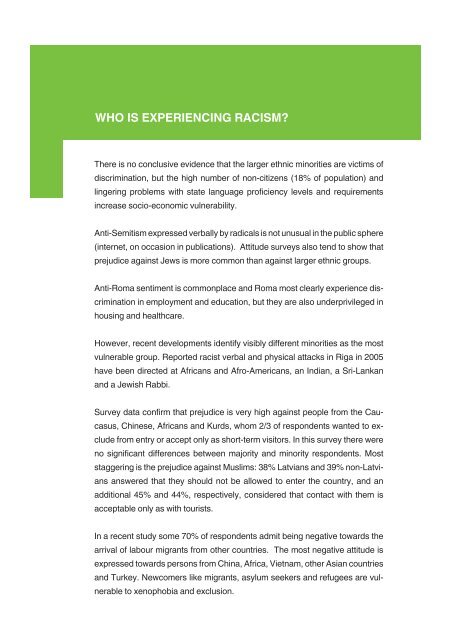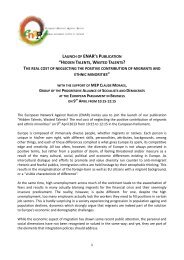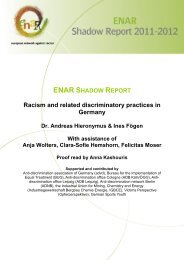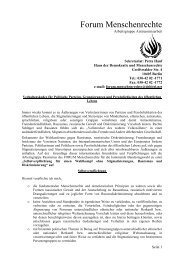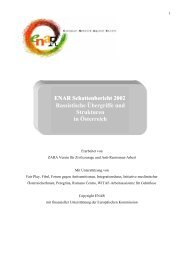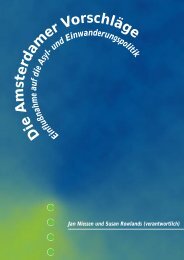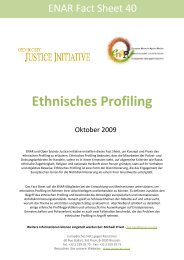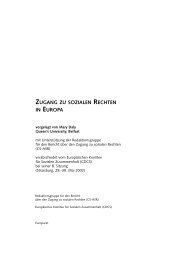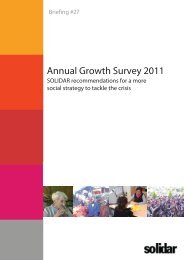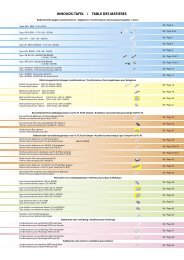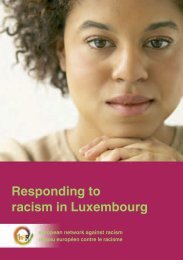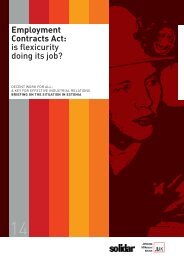Responding to racism in Latvia - Horus
Responding to racism in Latvia - Horus
Responding to racism in Latvia - Horus
Create successful ePaper yourself
Turn your PDF publications into a flip-book with our unique Google optimized e-Paper software.
who is ExpEriEnc<strong>in</strong>g <strong>racism</strong>?<br />
There is no conclusive evidence that the larger ethnic m<strong>in</strong>orities are victims of<br />
discrim<strong>in</strong>ation, but the high number of non-citizens (18% of population) and<br />
l<strong>in</strong>ger<strong>in</strong>g problems with state language proficiency levels and requirements<br />
<strong>in</strong>crease socio-economic vulnerability.<br />
Anti-Semitism expressed verbally by radicals is not unusual <strong>in</strong> the public sphere<br />
(<strong>in</strong>ternet, on occasion <strong>in</strong> publications). Attitude surveys also tend <strong>to</strong> show that<br />
prejudice aga<strong>in</strong>st Jews is more common than aga<strong>in</strong>st larger ethnic groups.<br />
Anti-Roma sentiment is commonplace and Roma most clearly experience dis-<br />
crim<strong>in</strong>ation <strong>in</strong> employment and education, but they are also underprivileged <strong>in</strong><br />
hous<strong>in</strong>g and healthcare.<br />
However, recent developments identify visibly different m<strong>in</strong>orities as the most<br />
vulnerable group. Reported racist verbal and physical attacks <strong>in</strong> Riga <strong>in</strong> 2005<br />
have been directed at Africans and Afro-Americans, an Indian, a Sri-Lankan<br />
and a Jewish Rabbi.<br />
Survey data confirm that prejudice is very high aga<strong>in</strong>st people from the Cau-<br />
casus, Ch<strong>in</strong>ese, Africans and Kurds, whom 2/3 of respondents wanted <strong>to</strong> ex-<br />
clude from entry or accept only as short-term visi<strong>to</strong>rs. In this survey there were<br />
no significant differences between majority and m<strong>in</strong>ority respondents. Most<br />
stagger<strong>in</strong>g is the prejudice aga<strong>in</strong>st Muslims: 38% <strong>Latvia</strong>ns and 39% non-Latvi-<br />
ans answered that they should not be allowed <strong>to</strong> enter the country, and an<br />
additional 45% and 44%, respectively, considered that contact with them is<br />
acceptable only as with <strong>to</strong>urists.<br />
In a recent study some 70% of respondents admit be<strong>in</strong>g negative <strong>to</strong>wards the<br />
arrival of labour migrants from other countries. The most negative attitude is<br />
expressed <strong>to</strong>wards persons from Ch<strong>in</strong>a, Africa, Vietnam, other Asian countries<br />
and Turkey. Newcomers like migrants, asylum seekers and refugees are vul-<br />
nerable <strong>to</strong> xenophobia and exclusion.


